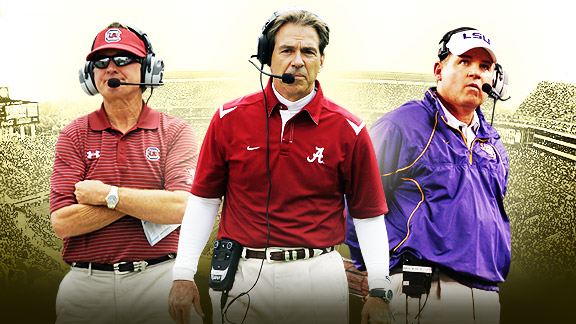The Page 2 SEC coaches' questionnaire
There's no match for the intensity of the SEC schedule.
Week in and week out, it's a murderer's row of teams playing in some of college football's most hallowed stadiums, in front of some of the world's most fanatical supporters.But away from that pressure cooker, the SEC coaches are a small, elite fraternity. They're cordial and have a healthy respect for each other and the jobs they're entrusted with.
All 12 coaches made the trek to Bristol on Monday and Tuesday to talk about the season. Page 2 took the opportunity to get to know them a little better. They discussed everything from the toughest place to play to Nick Saban's wardrobe. And who knew that coachspeak even extended to being fearful of naming a favorite restaurant?
The Page 2 questionnaire:
Which SEC stadium has the most hostile environment?
Derek Dooley, Tennessee: Obviously, I would start with Neyland Stadium at the University of Tennessee. But my experience in the SEC has been that nearly every stadium is the most hostile when that team is playing well and you're not. Generally it gets hostile when there's a great football game between two quality opponents in their league and the other team's playing real well. It kind of changes, it really does, whether it's Tiger Stadium [at LSU] or Sanford Stadium [at Georgia] or [Auburn's] Jordan-Hare Stadium or The Swamp [at Florida]. There's been times when I've been at all those stadiums when I said, "This is the most hostile." And then it gets trumped.
Steve Spurrier, South Carolina: We think ours is, of course, at Williams-Brice. I'm asked that a lot. They're all loud. I wear a headset so I don't hear it like maybe a lot of coaches. So none of them have got to where they affect us too much. You just have to tune the noise out. Obviously, The Swamp was awfully loud, and still is. But I can't pick one to be the loudest.
Houston Nutt, Ole Miss: It's very difficult in the SEC. LSU, Tennessee, Alabama, Florida, Auburn. I mean there's a few that don't make that much difference, but very few.
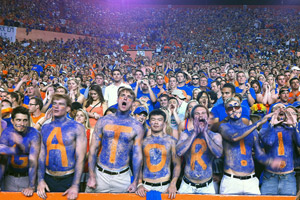
Will Muschamp, Florida: The Swamp. (Gives the Muschamp stare.)
Dan Mullen, Mississippi State: I would have to say Alabama. It's a great stadium, a neat atmosphere, an unbelievable crowd. Loud. Obviously they have a great football team, too, on top of it, that runs coming out of the tunnel. I would say Alabama's probably the toughest stadium, besides us.
Gene Chizik, Auburn: (Incredulous.) Auburn. It's not even close. Are you kidding me? (Turns serious.) You can pick any SEC school and it's all the most incredible environment.
Joker Phillips, Kentucky: I would say they all are. I mean, we're in the SEC. All of the stadiums are hostile environments. We've got crazy wild fans in this league.
Mark Richt, Georgia: Without question, Sanford Stadium. Without question.
Bobby Petrino, Arkansas: (Smiles.) University of Arkansas.
James Franklin, Vanderbilt: With this being my first year at Vanderbilt, I'll have to answer that question at the end of the season. I'll have a better perspective. I've coached in the ACC, in the Big 12, in the Pac-10, I've coached in the NFL. But this will be my first experience in the SEC, so I'll be able to answer that after this year.
Les Miles, LSU: By far and away, LSU's. There was a piece on my desk. Somebody took a poll. It was the top 10 most intimidating venues in the world. The first one was a soccer stadium in Turkey where automatic weapons were discharged in the stands. Wembley Stadium [in London] was third. The tenth spot on that list was old Yankee Stadium. And fifth was LSU Tigers, at Death Valley, in Baton Rouge, Louisiana.
Nick Saban, Alabama: I would hope that somebody out there would say ours when they have to play there. But LSU's a tough place to play. I always felt that way when I was the coach there, and I certainly feel that way when we go back there. There are a lot of tough places to play in the SEC. The Swamp at Florida is a tough place. Tennessee is a tough place. For us, it's always tough to go play at Auburn. It's a great league with a lot of great venues as far as stadiums.
What's your biggest superstition?
Dooley: I'm not a superstition guy, but I am a routine guy. In fact the one thing I do on purpose is change it up just to prove that our ability to win has nothing to do with my underwear. I'll change up the tie, I'll change up the coat. I don't like to change my routine.
Spurrier: Not too much. I generally try to work out before every game on Saturday. If we have one of those noon games, my workout may be just a walk around the hotel parking lot, so it's quick. That's probably my only little superstition.
Muschamp: I'm not a superstitious guy at all. I don't really have anything or any certain game day routine I have or anything.
Nutt: Same socks, maybe same underwear. One of those deals. Now, it's washed and all those things. I kind of get in a habit sometimes. I've kind of gotten away from that. This is my 14th year now.
Mullen: I used to be real superstitious when I played. Putting the shoes on in the exact order and tying things up. But I would say I got rid of a lot of them. The only thing I do, about 15 minutes before kickoff, I always text my wife and send her a message right before kickoff.
Chizik: I have absolutely no superstitions. Zero. I don't believe in that.
Phillips: I'm one of those guys that likes to get a workout, whether it's a walk or run on game day to just clear your mind and get away from it.
Richt: I can't think of a thing really that I do that would be considered superstitious.
Petrino: I have traditions, not superstitions. On game day, you know, how you get dressed, how you go out in the stadium. What sock you put on first, what leg you put in your pants first. I know it hasn't helped us win one game.
Franklin: I am not a real superstitious guy. My dad was a military guy, so I'm more of an S.O.P. guy, a standard operating procedure … I'm more that than I am kind of a routine from a superstitious standpoint.
Miles: I am certainly superstitious. I think it's more of a need for routine and to make sure the routine goes uniformly as it's always gone. We eat at the same time, we dress at the same time, we meet at the same time, we walk through at the same time. We're at the stadium Friday night before the game at the same time. We see a movie as a team. It's a need and a necessity of being comfortable in what to expect in my day before I play in the game.
Saban: I am superstitious. The year we won the national championship, my daughter used to give me a penny before every game. There were a couple of times where she'd gone out the night before and I didn't see her, and I'd leave before she got up. And we'd have to meet in the tunnel before the game so I could get my penny. And it worked 14 times in a row. That was a superstition that I kind of enjoyed and she felt like she was making a great contribution to what went on. I always wear a straw hat to practice. I have one hanging in my office that looks like it wouldn't be fit for a scarecrow to wear. Because when we were winning, I wouldn't change hats. Every now and then, I throw them on the ground, so they take a beating.
Obviously, you all travel a lot. Do you have a must-stop restaurant that you have to hit if you're nearby?
Dooley: If I said something locally, I'll have the whole town in an uproar. When I'm in Dallas, Texas, there's a Mexican restaurant called Mia's. If I knew I had one more meal left to go, I'd probably get on a flight to Dallas and get the tacos al carbon at Mia's.
Spurrier: My one in Columbia is a little Greek restaurant called Angelo's. Then there's another one called Blue Marlin. There's one in Gainesville called Napolatano's, a little Italian pizza place. In fact, I went by there in Gainesville this summer.
Muschamp: I love eating great food. As far as restaurants are concerned, Mark's in Gainesville is the best steak in town. Everywhere I've been, I've got somewhere I'm gonna go. There's a great boiled peanuts stand in Tift County, Ga., on I-75. Eddie V's in Austin, Texas. Phenomenal. Baton Rouge has several places.
Nutt: There's so many. I could get in real trouble on this one, you know what I mean. Here's the thing: I love to eat, whether it's fish, steak, hamburgers. I don't smoke or drink. They're all good to me.
Mullen: We have all kinds of barbecue down there. You can get a great steak over at Cappe's Steakhouse in Starkville. My must-stops are more when I come back up here [in New England]. I gotta get me some pizza. I've got to get down to Sally's to get some pizza down in New Haven [Conn.].
Chizik: No question. Pappadeaux [the Cajun chain]. I was brought up on Pappadeaux. If I'm in Atlanta, and I can get to one, I'm going to Pappadeaux. The crawfish etoufee. Can't beat it. That or the seafood platter. And the shrimp fondue. (Page 2: Even if you're in Louisiana?) Probably. Can't lie.
Phillips: In San Francisco, there was a little local store, really a deli, down the street from San Francisco City College. You had to have one of the hot sandwiches there. I can't remember the name of it right now. But I always tell the coaches that go out there that you have to have George Rush [the coach at San Francisco City College] take you out there.
Richt: When I go back to Boca Raton, Fla., if I'm recruiting anybody within a 30-mile radius, I'm going to go to Jerry's Pizzeria in Boca Raton. I've known Jerry since I was a kid and he's still there doing it. Then I spent 15 years at Florida State, so if I'm anywhere near Tallahassee, I'm going to Jim & Milt's Barbecue. Those are two that I've gotta do.
Petrino: (Nothing came to mind.)
Franklin: In Nashville, I would say BrickTop's. But I grew up just outside of Philadelphia, so I'm a cheesesteak guy. A lot of people talk about Geno's and Pat's and Jim's, but when you grow up there, everybody has their corner shop, or their little hometown spot. (Page 2: Is there one you'll endorse?) Not really. I don't know if I'm comfortable doing that. If I name one without the other one, people at home are going to be upset with me.
Miles: I will occasionally get excited to taste a rib joint in some distant area with a mustard sauce, just if I can get to it. Sometimes there's a seafood joint on the ocean that's got a great view, and if I happen to go by there, and I can get crab cakes or something like that, I'll do that. But there's no specific spot.
Saban: You know what? My wife would tell you that I am the worst person about going out to eat. I would rather eat at home. She's a good cook, she's Italian. And I guess through the years, it seems that most places you go to go out and eat, people sometimes bother you a little bit, or ask you questions. Not that I mind people doing that, but it's just hard to enjoy yourself. I really enjoy the people, spending time with them, and I'm flattered that they ask. But restaurants seem to be a magnet for people to get to you. Probably the one, when I was growing up, there was an Italian restaurant called Muriel's in my hometown in West Virginia. And we always go there when we go home. Always.
Which cliché is most overused by coaches?
Dooley: "Buy in." "Are the players bought in?" (Page 2: Do you use that?) No. But it slips out every now and then and I just hit myself every time I say it.
Spurrier: The two words that I try not to use are "great" and "football." When I was getting into coaching, I would hear these coaches say "We've got a great football team ready to play, but we've got some tough football games, and we don't know if our football team can handle the road schedule against these great football teams." Everything was great and everything was football. I tried to learn some new adjectives: Outstanding, spectacular, super. I use super a lot. (Laughs)
Muschamp: "We've got a young team." That's one that gets a little … It's your job to get them ready.
Nutt: "He played hard." And "great" is a word way overused.
Mullen: We use a lot of them, right? What's the most-used one? I don't know. The amazing thing, if you really look at the clichés coaches use, there's absolute truth behind them. The only way to succeed is hard work in whatever you're going to do. There's only so many ways you can say it and get it through to your kids, but it ends up sounding clichéd.
Chizik: Definitely "We're going to take this one game at a time." Although I use it all the time, so I better be careful.
Phillips: Probably "Speed kills."
Richt: For a while there, it was "It is what it is." I guess, "If we stay healthy, things can go well." Or "We want to jell as a team." But they're true. That's why they become clichés.
Petrino: Oh boy, there's a lot of them. I don't know which one's most overused. But the one I understand the least is when people say, "You make your most improvement from Game 1 to Game 2." That one I don't get at all.
Franklin: "Take it one game at a time." But if people ask me what we're going to do this year, we're going to take it one game at a time. We're focused on Elon. I really believe in that philosophy, but it's overused.
Miles: I have no idea. I am not that coach. I don't operate that way. I fight for unique and accurate ways to be descriptive. I don't necessarily handle it that way.
Saban: Well you know, I really can't say one in particular. We all talk about focus and preparation. And sometimes I think we talk to our players about these things, and I'm not sure our players understand what these things are or how to do these things. We probably should spend a little more time explaining to them exactly what we expect so they can do these things better. If we talk about intensity all the time, I'm not sure a player could tell you what intensity is. Sometimes I define that qualm.
Who's the best-dressed coach in the conference?
Dooley, who was an assistant coach under Saban for seven years: I've been with Nick a long time. I would say he got the Most Improved award from his first year at LSU. He had a long way to go coming from Michigan State, so I'm going to give him Most Improved. I'm not going to give him Best-Dressed. (Asks his assistant, Adam Dicus, what he thinks. Dicus says Sandra Bullock liked Saban in "The Blind Side," so he should give it to him.) It's a good thing they didn't film that movie back in 2000. Because Bullock wouldn't have been all over him.
Spurrier: (We didn't say "conference.") Well, it used to be [Jim] Tressel. (Laughs.)
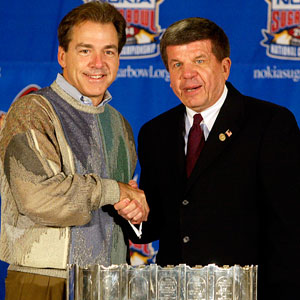
Muschamp: (Laughs) I could go a lot of ways with this one. Certainly Derek Dooley is going to claim that he's the best-dressed. Self-proclamation for him. It's certainly not me, I can tell you that. I would obviously give the vote to Derek because he's going to vote for himself. (Told of Dooley's most-improved nod for Saban.) There's no question. [Saban] got rid of the Cosby sweaters he had at LSU. And you can print me on that.
Nutt: I only see them on TV walking into the stadium. I don't think they're very well-dressed. (Laughs.)
Mullen: That is a tough call. Coach Dooley's always sharp. He always looks really sharp. And he's a former attorney, so he has probably a lot more suits than the rest of us. I've probably got more shorts and T-shirts. (Dooley chimes in, saying he pulled his wardrobe out when he got his head coaching job, excited that he could re-use his lawyer attire.)
Chizik: Me. No, I'm just kidding. I couldn't tell you. I haven't paid a lot of attention to who dresses nice.
Phillips: I rode in with Nick Saban, and he's pretty well-dressed, and I think James Franklin's making a run for it too.
Richt: Wow. That's a tough one. Everyone's so dapper and handsome today, I'd have to say it's a tie.
Petrino: I'd have to say the new guy, James Franklin.
Franklin: It's got to be James Franklin. It's got to be. (Laughs.) In the black and gold, I mean it's great colors, a great combination. I dare not say another SEC coach. I try not to spend much time talking about the other SEC coaches and other programs. We hear enough about them. It's time to start talking about Vanderbilt.
Miles: Well, certainly, me. I have to be honest and humble here. It's gotta be somebody. So why not me? (It's the hat, isn't it?) It's the lack of a hat. If you would've said best-looking, it would've been a bunch of other guys.
Saban: Knowing Derek Dooley, like I know him after he worked for me for seven years … I would say that if you went and did inventory, he's got more shoes and more things to wear to try to be the best-dressed than any of us.
(Saban is told of Dooley's Most Improved proclamation, and Muschamp's Cosby sweaters crack.)
Most Improved? (Pauses.) That's my boys. That's what I've got to live with. Those guys.
What's one of your favorite songs, or name your favorite musician.
Dooley: I got introduced to Kenny [Chesney]. I've always been a fan, but now that he's a Vols fan … People make fun of me because every time all summer, my wife finally said, "Enough of Kenny Chesney, can we just listen to something else?" If you looked at my iPod, you would think that something's wrong with me because I have a little bit of everything. You would never understand what I like. Based on my mood, I hit that shuffle button, and let it flow.
Spurrier: A song I've been listening to lately is that Kenny Rogers song, "A Blaze of Glory." (Does that have any particular meaning?) Well, I hope to go out in a blaze of glory. I hope to. Yep.
Muschamp: "Crazy Love" by Van Morrison. That was the first dance for my wife and I after we got married.
Nutt: I'm a wide variety. I'm a '70s guy. So what do I love? Commodores, Earth Wind & Fire. Elvis Presley. I got a long range.
Mullen: I saw the U2 concert this year. "With or Without You" has got to be my favorite song. "Until The End of the World" is a close second, which is probably not a popular one. I'd be wrong to not say "Bless the Broken Road," (by Rascal Flatts) because that was the song me and my wife danced to at our wedding.
Chizik: One of my all-time favorites is Neil Diamond. Love it. Absolutely. "Coming to America," "Red Red Wine," I've got 'em all.
Phillips: I used to listen to a song when I played from Morris Day and the Time called "777-9311." I don't know why. Just because I liked the sound and the beat of it. I listened to that one before I played [in a game].
Richt: Believe it or not, it's called "Thinking About You." And it was written and performed by my son, David. It's pretty cool. But that's by far my favorite song.
Petrino: Oh, gosh, going way back. It's hard for me to pick one favorite. I'm not a big music guy.
Franklin: I'm not really a favorites guy in general. If I had to say an artist that I like, probably Jay-Z. I kind of grew up in the Biggie time, as well [referring to Notorious B.I.G.].
Miles: I love Lil Wayne, I've listened to him a bunch most recently. I like Akon. I've really kind of got away from hip-hop, and I listen to country. I listen to Kenny Chesney pretty routinely. I enjoy a variety of music, it's not just one guy. There for a while, I was all over Toby Keith. I kind of move with what's going on.
Saban: I'm a big Eagles fan. I've seen them in concert three or four times. I have their concerts on tape that i watch at home. I have about four DVDs that I play on my boat, in my car, at home. And the only other artist I spend any time listening to is Michael Jackson. "This Is It" really kind of rejuvenated some of his talent to me. And I really enjoy listening to that.
What was your first coaching job and how much did it pay?
Dooley: I was practicing law. I owned a house in Atlanta. I was feeling good, we were gonna live happily ever after. And then I got into coaching and my first job was making $10,000 a year as a graduate assistant, basically making coffee for Joe Kines [the defensive coordinator at Georgia]. That was quite a change in life.
Spurrier: Quarterback coach at Florida. Paid $26K. Second year, quarterback coach at Georgia Tech. Paid $26K. Third year, quarterback coach and offensive coordinator at Duke. Paid $27K.
Muschamp: My first full-time job was at West Georgia, and I want to say I made $17,000 a year.
Nutt: Oklahoma State University in 1981. $1.65 an hour.
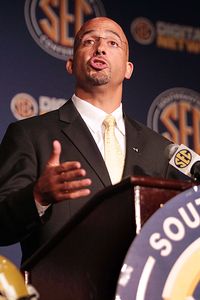
Mullen: I think the first time I ever really did any coaching, it paid zero. It was youth league football. I was one of the older kids, and the guy who ran the league … there was an issue. And he asked if I could go coach the 6- and 7-year-old team. I was 12 years old, and went over and coached the team, and we went on to victory that day. So it was a good thing.
Chizik: I was a [graduate assistant] at Middle Tennessee State. I was making $5,000 a year, in 1990.
Phillips: It was at Kentucky, in 1991. It paid about $35,000, and I hit the lottery.
Richt: I coached at Pope John Paul High School in Boca Raton [Fla.]. I'm not even sure I got paid for that. (Laughs.) We shouldn't have gotten paid, we were 0-10.
Petrino: My first coaching job was at that time called a restricted earnings coach at Weber State. I got a scholarship check each month for $245.
Franklin: My first job was at Kutztown in Pennsylvania, where a really good player named John Mobley came from, played in the NFL for 10 years. I made $1,200. I filled soda machines up in the morning on campus. I was the receivers coach. I lived in some man's basement that smelled like mothballs. And in the offseason on Sundays, I bartended.
Miles: I made $8,200. I turned in a job in transportation where I was making right around $50,000 right around 1977-78 to go back to school at Michigan and be a G.A. for coach [Bo] Schembechler for $8,200 a year.
Saban: My first job at Kent State, I made $8,000 a year coaching linebackers. My question would be, what's that $8,000 worth today?
Who was your favorite athlete growing up?
Dooley: Well, I had a bunch of them. It was hard not to say Herschel Walker. It was at a time when I was 12, 13, 14, on the sidelines of every football game [at Georgia, where his father, Vince Dooley, was the coach]. [Herschel] was the guy. Of course, he made my dad look pretty good. He was probably my favorite. I was an Atlanta Braves guy and they were terrible. But I was a Boston Celtics guy and a Dallas Cowboys guy. Those were my teams.
Spurrier: I grew up in East Tennessee. Probably some of those Tennessee tailbacks. I'd say Johnny Majors.
Muschamp: I had a bunch. The first guy I really identified with was Roger Staubach from the Dallas Cowboys. That would be the guy that I used to be in the backyard and pretend I was him.
Nutt: I had several. I really looked up to Roger Staubach, Joe Namath, Jerry West. Those are the big ones for me.
Mullen: I guess different phases of your life you go through different people. When I was a real little kid, I loved O.J. Simpson. He was really cool. Back then. (Laughs.) Back when he played for the Bills. But I'd have to go with Michael Jordan. Because when the game was on the line, he always wanted the ball in his hands.
Chizik: The Miami Dolphins were my favorite team. My favorite athlete growing up was Dr. J. I loved watching him when he was with the Sixers.
Phillips: Dr. J. I grew up in the Dr. J era. My mom wouldn't let me look at NBA basketball unless I went to church. So I couldn't wait to get up and go to church on Sunday and come home and watch Dr. J.
Richt: Joe Namath, without question, was my hero. I had a picture of him in my wallet. As I laid my head on my pillow, there was a little desk drawer next to me, and it had Broadway Joe's picture there.
Petrino: I always liked Roger Staubach. I think he was my favorite.
Franklin: Probably Dr. J. I kind of grew up in a great time for sports. We're probably all biased about the times that we grew up. But watching Dr. J and Michael Jordan and Larry Bird. [Marvin] Hagler, [Michael] Spinks and [Thomas] Hearns. I remember sitting in my living room with my dad … great boxing, great baseball with Mike Schmidt when I was growing up in Philadelphia. Those times. I'm a hometown guy. I'm not a guy where you grow up in Philadelphia and your basketball team is the Lakers, and your football team is the Patriots. I don't really understand that. To me, you support your hometown team.
Miles: Mickey Mantle. Yeah, No. 7. I enjoyed him tremendously. He and Jim Brown. I was a Cleveland boy, and he was something special. Did some great things. I went to those games with my father, and really as a family, and he was the deal.
Saban: When I was a little kid, it was Roberto Clemente. Because where I lived in West Virginia, everybody was Pittsburgh Pirate fans. He was just a fantastic player and had lots of character. I played baseball and basketball. And Jerry West was always my favorite basketball player, because he went to West Virginia and played for the Lakers. I'm still a Lakers fan, because when I was a kid he played for the Lakers. But I'd say those two come to mind as quickly as anyone.
What's the strangest thing anyone's ever said to you in a postgame handshake?
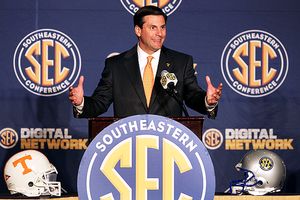
Dooley: Well, I had 15 postgame handshakes, and I don't know if you know that. We only played 13 games. I was 8-7 in them. (Dooley celebrated early in two games that appeared to be over, a 16-14 loss at LSU and a 30-27 double-overtime loss to North Carolina in the Music City Bowl. Both opponents scored on the last play of the game, after a penalty kept the game from ending.) I don't really even hear what they say. I'm so either happy that we won or so upset at how we lost the game, I don't even know what they say. I wouldn't know if they called me a bad word.
Spurrier: Not really much of anything. I always hope they'll say, "You've got a really good team."
Muschamp: Nothing I can repeat. Nothing I can repeat.
Nutt: Not too much. "Great game. Played hard." (Laughs.)
Mullen: It's usually like, "Hey, good game." To me, it's maybe the things that aren't said. Sometimes there are some silent postgame handshakes, and just a look after the game.
Chizik: I had one guy shake my hand and say nothing. Zero.
Phillips: Usually coaches are just saying "Good luck." Nobody ever goes past that. I don't know if anybody means it. (Laughs.) But everybody uses "Good luck."
Richt: I think the strangest postgame handshake I've been involved with was in 2002, when we were playing South Carolina. I was a second-year head coach at Georgia and Lou Holtz was still the coach at South Carolina. We ended up winning the game like 9-6 or something. (Note: It was actually 13-7.) It was one of those games where hardly anybody scored. South Carolina was just getting ready to score to take the lead in the final minutes. And they ended up fumbling the ball and we got it. It was kind of a back-and-forth game, and when I shook hands with Coach Holtz, neither of us said a word. We just looked at each other. It was one of those emotional games where there was nothing left in the tank.
Petrino: There's been a few. One time we scored on the last play of the game. The fullback ran the ball for like 45 yards and a touchdown. The coach got upset about us scoring at the end. But the whole deal was he called timeout. So I just told him, "You shouldn't have called timeout. The clock would've run out." There's always a few things.
Franklin: I'll be intrigued to see what they're like. After a tough loss or a tough win, what do you really say? The most important thing is to show respect. Whether you won real big, they don't want to hear anything from you. If you lost, you don't want to hear anything from them. The most important thing is to keep it brief and move on.
Miles: Most of the time, it's pretty routine. But there are some guys whose hands I've shaked after a game who could not communicate based on the fact that they were either celebrating victory, or they just didn't know what to say, because of the other. Give you an example: There was a handshake that I had after one game where the guy went, "Ughhhhhhhhh." I said, "No kidding?"
Saban: The first year I was a head coach at Michigan State, the first game we played was against Nebraska when Tom Osborne was the coach. Here, I'd been in the NFL for the four, five, six years, I can't remember exactly how long. Here we play Nebraska, who goes on to win the national championship. I mean they've got a really good team. And we're playing at Michigan State. I'm looking at this like Nebraska's just like anybody else, because I don't know that they're that much better than everybody. I've been coaching in the NFL for a long time. And they beat us like 55-14. I mean, it was unbelievable. Physically, emotionally and everything else. Tom Osborne comes across the field and we shake at the end of the game, and he puts his arm around me and says, "You're not as bad as you think." And I didn't really know what he meant by that. Really what he meant was, "We've got a really, really good team here. So when you play somebody your own size, you'll be fine." And he was right. We went on to win six games, beat Michigan that year, went to a bowl game. For a first year starting a program, we didn't have a bad team. But it sure seemed like it that day.
Dave Wilson is an editor for Page 2.
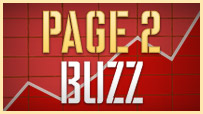 |
| • Philbrick: Page 2's Greatest Hits, 2000-2012 |
| • Caple: Fond memories of a road warrior |
| • Snibbe: An illustrated history of Page 2 |
| Philbrick, Gallo: Farewell podcast |
